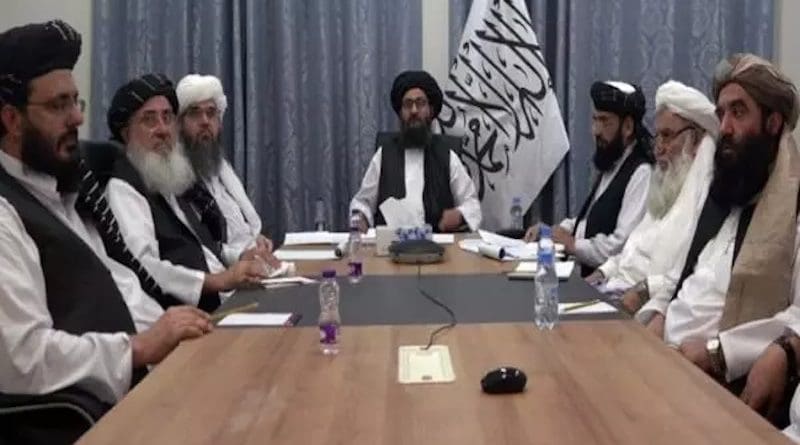Afghanistan’s Enigma Under Taliban Rule – OpEd
It has been 20 months since the Taliban seized control of Kabul, bringing an end to two decades of warfare in Afghanistan. However, the cessation of hostilities has not translated into an improvement in the lives of millions of Afghans, as the nation grapples with severe humanitarian and human rights crises. While the Taliban, with the assistance of the UN, has managed to sustain certain government functions, the regime has been marred by violations of basic human and civil rights, suppression of dissent, and a steadfast rejection of any form of national dialogue or political inclusivity.
The country is now governed by a small and secluded circle of leaders who seem determined to root out dissent and marginalize women from public life. This approach, albeit consolidating power, risks deepening the international isolation of Afghanistan and further impoverishing its population. Without substantive changes to the core of the system, the prospect of improved governance and stability remains constrained.
Service Delivery: A Fragile Equilibrium
In the aftermath of the Taliban takeover, Afghanistan experienced a massive economic shock, with the gross domestic product (GDP) shrinking between 30 and 35 percent. However, the country’s economy is no longer in freefall, thanks to the cessation of hostilities and UN cash transfers. A delicate economic equilibrium has been established, yet it has left the majority of the country in poverty, with two-thirds of the population reliant on international assistance for survival. Despite economic challenges, the Taliban government has managed to collect some budget revenue, primarily through the mining industry and taxes on the illegal drug trade. However, the lack of transparency regarding expenditures raises concerns about the allocation of resources, with suspicions that the security sector might dominate the government budget.
The World Bank reports that while merchants are benefitting from reduced corruption and safer roads, they face challenges such as sanctions, legal uncertainty, increased taxes, and a depleted customer base. Notably, recent decrees aimed at curbing nepotism and bribery within the Taliban government may indicate an increasing incidence of corruption. Education and Women’s Rights: A Regressive Stance The education sector has taken a significant hit under Taliban rule, particularly with the ban on girls attending secondary school and university at both public and private institutions. This regressive stance is causing irreparable harm to Afghan youth and jeopardizing the nation’s future. Nevertheless, the Taliban has continued to pay the salaries of female schoolteachers, showcasing a paradoxical approach to women’s roles in society.
While enrollment numbers in primary schools for both boys and girls have increased in certain areas, the restriction on girls’ education represents a severe setback for gender equality and the overall development of the Afghan population. Shifting Dynamics The Taliban’s management of the economy demonstrates a nuanced approach. The mining industry has emerged as a significant contributor to public revenue and exports, offering a lifeline for economic stability. The country’s electricity import bill is being paid, ensuring power supply to most regions, albeit with regular blackouts. However, the urban-based middle class, once a major beneficiary of international assistance, has been decimated, further exacerbating economic challenges. The Taliban’s inclination toward Islamic finance, aiming to replace conventional banking, introduces uncertainties in the banking sector. While the private sector faces obstacles such as sanctions, legal uncertainties, and an impoverished customer base, recent efforts to curb corruption may positively impact business environments. Nonetheless, the lack of a clear timeline for adopting Islamic finance adds to the economic uncertainties.
An Elusive Inclusivity
Despite initial hopes for an inclusive government, the Taliban has effectively reinstated the Islamic Emirate, concentrating power in the hands of top religious figures. The current administration operates as a caretaker government with no defined timetable for a permanent government, reflecting internal tensions and competition for key posts within the Taliban. The lack of intra-Afghan dialogue or reconciliation beyond the Taliban’s offer of protection to politicians associated with the previous regime raises questions about the regime’s commitment to inclusivity.
The promise of amnesty, while public, contrasts with documented instances of extrajudicial killings, arbitrary arrests, and torture, particularly targeting ex-military officials. Afghanistan’s independent media has crumbled under Taliban rule, stifling free speech, and eliminating public criticism. The Taliban’s struggle to suppress armed resistance in the north and the persistent threat from the Islamic State Khorasan Province (ISKP) underscore ongoing security challenges.
Erosion of Justice and Rights
The Taliban’s suspension of prosecution departments, purging of the judiciary, and abolition of the independent bar association have led to the direct appointment of judges by the group. Female judges no longer preside over trials, and the legal system operates under the Hanafi School of Islamic law, dispelling notions of a fair and impartial justice system. In public, the police and officials of the Ministry of Propagation of Virtue and Prevention of Vice summarily discipline citizens for violating the Taliban’s uncodified rules. While the Taliban has suspended existing laws, administrative laws continue to operate to sustain the bureaucracy and revenue collection. The Taliban’s legal and political developments over the past 20 months indicate a consolidation of power in Kabul. However, this governance model, centered around a small circle of leaders, raises concerns about the nation’s future trajectory. While the regime has managed to provide basic services and economic stability, these achievements remain contingent on humanitarian assistance, leaving Afghanistan in a precarious state.
The absence of political inclusivity, restrictions on education and women’s rights, economic challenges, and erosion of the legal system highlight the complexities facing Afghanistan under Taliban rule. Unless there is a significant shift in the core of the system, the nation may continue to grapple with poverty, instability, and repressive governance. In scrutinizing the Taliban’s performance, the international community must remain vigilant, emphasizing the importance of human rights, inclusivity, and a sustainable path forward for Afghanistan.

